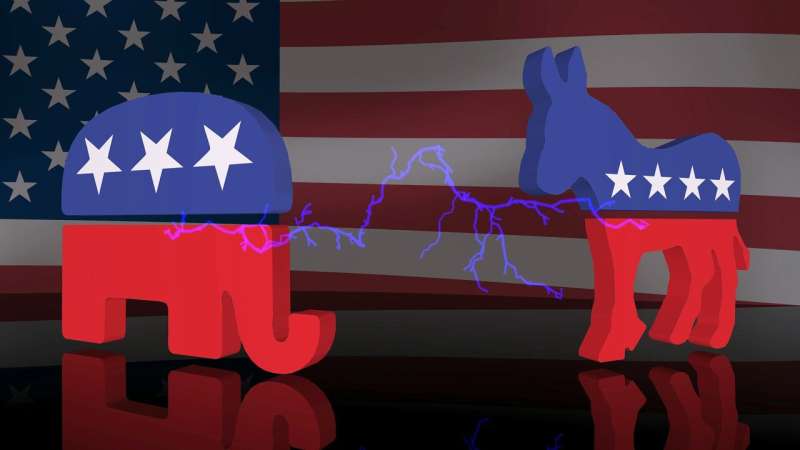Partisans willing to upend democracy to help their party win even when polarization is diminished

There has long been an assumption that a connection exists between affective polarization (i.e., partisan dislike of those in the other party) and anti-democratic attitudes. For that reason, policymakers and practitioners have focused on depolarization strategies to strengthen democracy.
A groundbreaking study published today in Nature Human Behaviour, tests several depolarization interventions and finds that, while they depolarize, they do not affect anti-democratic attitudes.
“Interventions that reduce the extent to which partisans do not like each other do not seem to alter or reduce the extent to which they hold anti-democratic attitudes,” said political scientist James Druckman, one of the study’s researchers. “We need to think about ways to help people see the value of democracy unto itself regardless of party.”
Druckman is the Payson S. Wild Professor of Political Science in the Weinberg College of Arts and Sciences and associate director of the Institute for Policy Research at Northwestern.
How the research was done
To investigate the effectiveness of polarization interventions in altering anti-democratic attitudes, The Strengthening Democracy Project, a multidisciplinary team of social scientists from Stanford University, Massachusetts Institute of Technology (MIT), Northwestern University and Columbia University conducted three studies with a combined sample of more than 8,000 partisans. In each study, participants were randomly assigned to a control condition or interventions designed to reduce affective polarization.
The interventions included correcting misperceptions about supporters of the other party, asking people to think of a friend who supports the other party, or showing the friendship between the late Republican Sen. John McCain and Democratic President Joe Biden. The researchers found that all three interventions measurably decreased the degree of out-party animosity among study participants, results that are in line with prior studies.
Expanding existing research, the social scientists also found that the interventions could increase prosocial behavior in economic interactions with outpartisans.
As a final step, researchers tested the effects of the interventions on several anti-democratic attitudes: participants’ willingness to support candidates who would sacrifice democratic principles to win an election; willingness to support partisan violence; and willingness to prioritize partisan ends over democratic means.
Expecting that the affective polarization measurements would correlate with less anti-democratic attitudes, the researchers were surprised to find there was no correlation with changes in attitude toward these anti-democratic practices.
As a next step, the research team is working on a larger project to explore under which conditions—if any—depolarization interventions reduce anti-democratic attitudes.
Other authors on the study, “Interventions reducing affective polarization do not necessarily improve anti-democratic attitudes,” include Jan G. Voelkel, James Chu, Joseph S. Mernyk, Chrystal Redekopp, Sophia Pink and Robb Willer of the Stanford University department of sociology; David G. Rand of Sloan School of Management at MIT; and Michael N. Stagnaro of the Stanford sociology department and Sloan School of Management at MIT.
More information:
Jan Voelkel, Interventions reducing affective polarization do not necessarily improve anti-democratic attitudes, Nature Human Behaviour (2022). DOI: 10.1038/s41562-022-01466-9. www.nature.com/articles/s41562-022-01466-9
Citation:
Partisans willing to upend democracy to help their party win even when polarization is diminished (2022, October 31)
retrieved 31 October 2022
from https://phys.org/news/2022-10-partisans-upend-democracy-party-polarization.html
This document is subject to copyright. Apart from any fair dealing for the purpose of private study or research, no
part may be reproduced without the written permission. The content is provided for information purposes only.
For all the latest Science News Click Here
For the latest news and updates, follow us on Google News.

